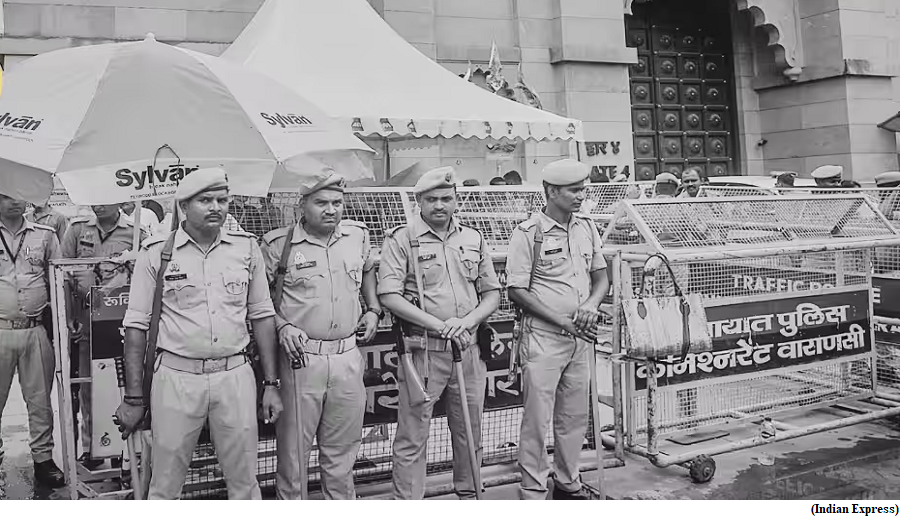E-court Mission, Development of digital, paperless online courts in India (GS Paper 2, Governance)

Why in news?
- The Centre has launched the E-courts Mission Mode Project as part of a national e-governance plan to modernise the court system in the country.
Details:
- This comes under the implementation for information and communication technology (ICT) development of the district & subordinate courts in the country based on the "National Policy and Action Plan for Implementation of Information and Communication Technology in the Indian Judiciary".
- The Department of Justice executes the project in collaboration with the e-Committee of the Supreme Court (SC).
- With the successful completion of Phase II and the announcement of Phase III, the nation is moving closer to paperless, online courts. Here is an overview of the project so far:
Phase I (2011-15):
- Basic computerisation and local network connectivity achieved at an expenditure of Rs 639.41 crore. 14,249 court sites were computerised in this phase.
Phase II (2015-2023):
- Focus on further development with an outlay of Rs 1,670 crore. So far, Rs 1,668.43 crore has been released by the government.
- 18,735 district & subordinate courts were computerised in this phase.
Some of the initiatives taken under this phase to make courts more accessible are:
- Wide Area Network (WAN) Project connects 99.4 per cent of court complexes across India with 10 Mbps to 100 Mbps bandwidth speed.
- National judicial data grid (NJDG) offers access to 235.8 million case information and 225.6 million orders/judgements, as of August 1.
- Case information software (CIS) has been developed for District and High Courts based on customised free and open-source software (FOSS).
- Seven real-time information platforms for lawyers and litigants have been launched through SMS push & pull, email, multilingual eCourts services portal, judicial service system, and information kiosks. This includes real-time information on case status, cause lists, judgements etc. Electronic case management tools (ECMT) have also been created with mobile app for lawyers JustIS app for judges.
- Video conferencing facilities for hearings and proceedings. Up till June 2023, 27.7 million virtual hearings have been conducted.
- Live streaming of court proceedings in Gujarat, Gauhati, Orissa, Karnataka, Jharkhand, Patna, Madhya Pradesh High Courts and the Supreme Court have been started to let concerned parties follow proceedings.
- 22 Virtual courts in 18 States/UTs handling traffic challan cases and collecting fines online have been operationalised.
- e-Filing System: This has been rolled out with upgraded features. A total of 20 High Courts have implemented e-payments.
- eSewa Kendras: 819 centers assisting with legal advice, information, and eFiling have been rolled out.
- Tele Law Programme: This e-interface platform connects disadvantaged sections with panel lawyers via video conferencing, telephone, and chat facilities.
- NSTEP: National service and tracking of electronic processes (NSTEP) is a technology-enabled process serving and issuing of summons implemented in 28 States/UTs.
Phase III
- The eCourt project has planned Phase III which aims to further ease the justice system by moving towards digital, paperless, and online courts.
- The budget allocation for this phase is Rs 7,000 crore, as announced in Union Budget 2023-2024.
- According to the "Detailed Project Report" approved by the e-committee of the Supreme Court, the Expenditure Finance Committee recommended Phase III of the project with a budget outlay of Rs 7,210 crore on February 23. The project is still pending approval.
Revenue Courts:
- The Revenue Courts are not part of the e-courts Mission Mode Project, as they fall under the jurisdiction of state governments.
Key provisions and processes proposed in Bill to replace CrPC
(GS Paper 2, Governance)
Why in news?
- Recently, the Union Home Minister introduced three new bills in the Lok Sabha to replace major sections of the law such as the Indian Penal Code (IPC) and the Code of Criminal Procedure (CrPc).
- He claimed that the following three bills would overhaul India's criminal justice system:
- The Bharatiya Nyaya Sanhita Bill, 2023 (to replace Indian Penal Code)
- The Bharatiya Sakshya Bill, 2023 (to replace the Indian Evidence Act, 1872)
- The Bharatiya Nagrik Suraksha Sanhita Bill, 2023 (to replace The Code of Criminal Procedure, 1973)

Bharatiya Nagarik Suraksha Sanhita, 2023:
- The Bharatiya Nagarik Suraksha Sanhita, 2023 proposes several important changes to the Criminal Procedure Code (CrPC) which guides the criminal justice system.
- From technological changes to allow trials via video-conferencing to allowing handcuffs for the arrest of persons in some cases including murder, rape, and counterfeit currency, these are some of the main changes proposed in the CrPC.
Greater use of technology:
- Trials, appeal proceedings, recording of depositions including those of public servants and police officers, may be held in electronic mode. The statement of the accused too can be recorded through video-conferencing. Summons, warrants, documents, police reports, statements of evidence can be done in electronic form.
- The search and seizure of articles and properties, the visit to a crime scene by a forensic expert, and the recording of the victim’s statement shall be audio-videographed, preferably on a mobile phone.
- The name and address of an arrested accused and the nature of the offence will be maintained by a designated officer in each police station and district, and shall be “prominently displayed” including in digital mode in every police station and district headquarters.
- Information to police too can be sent electronically, and it shall be taken on record on being signed by the person sending it, within three days.
Communication devices:
- On the directions of a court or police officer, a person is required to produce any document and now devices, that is likely to contain digital evidence for the purpose of an inquiry.
- Electronic communication is defined as “the communication of any written, verbal, pictorial information or video content transmitted (whether from one person to another, from one device to another or from a person to a device or from a device to a person).”
Use of handcuffs:
- A police officer may be permitted to use handcuffs while arresting a person if he is a habitual, repeat offender who escaped from custody, or has committed an organised crime, terrorist act, drug-related crime, illegal possession of arms, murder, rape, acid attack, counterfeit currency, human trafficking, sexual offence against children or offences against the state.
Specific safeguards:
- Section 41A of CrPC which has a prominent safeguard against arrests will get a new number, Section 35.
- It has an additional provision: no person can be arrested without prior permission of an officer, not below the rank of a deputy SP, in cases where the offence is punishable with less than three years, or if the person is infirm above 60 years of age.
- On receiving information in cognizable cases where the offence attracts 3-7 years, the police officer will conduct a preliminary inquiry to ascertain whether there exists a prima facie case to proceed within 14 days.
Mercy petitions:
- There is a provision on procedures for the timeframe to file mercy petitions in death sentence cases.
- After being informed by jail authorities about the disposal of the petition of a convict sentenced to death, he, or his legal heir or relative can submit a mercy petition within 30 days to the Governor.
- If rejected, the person can petition the President within 60 days. No appeal against the order of the President shall lie in any court.
Sanction to prosecute:
- A decision to grant or reject sanction to prosecute a public servant must be reached by the government within 120 days of receiving a request.
- If the government fails to do so, the sanction will be deemed to have been accorded. No sanction is required in cases including sexual offences, trafficking, etc.
Arms in procession:
- Section 144A of the CrPC gives the district magistrate the power to prohibit the carrying of arms in any procession, mass drill or mass training, to preserve the public peace.
- While the provisions granting powers to the DM to pass orders in urgent cases of nuisance or apprehended danger remain as they are in Section 144 of the CrPC, the provision to prohibit carrying arms does not find a mention.
Samples without arrest:
- The Bill has provisions for the magistrate to order any person to give samples of his signature, handwriting, voice or finger impressions for the purpose of investigation without being arrested.
Detention by police:
- There are provisions for police to detain or remove any person resisting, refusing or ignoring, or disregarding directions given as part of preventive action.



